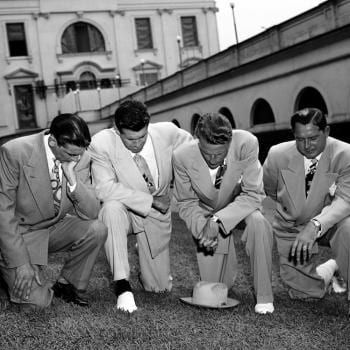I have already noticed the sort of odd phenomenon of progressive evangelical academics rallying to the side of a female Bible teacher who is anything but a scholar and not all that progressive. Here’s another example.
Pete Enns makes some useful points about the nature of academic life and scholarly expertise. He does so in a way to counter critics of expertise:
There’s nothing like spending a few years after college (for me it was 9) studying a field and getting your head handed to you by people who have a different perspective and know a lot—i.e., professors, experts. And doing that in community where you are accountable to someone other than yourself or your buddies . . . it’s a transformative experience.
One thing you gain in a setting like that is simply watching scholarship being done, which seeps into you and, if anything, helps you pick out really bad arguments when you see them.
An education done in community gives you a context to judge when someone is onto something or out of their element and simply shooting from the hip.
But what a formal education can give, besides exposure to real people who’ve earned the right to speak, is self-awareness. In part that means learning to be deeply self-critical—always looking to turn over some other rock and see what lies there, becoming cognizant of your own limitations and thus being open to new ways of thinking, provided that is not flakey.
If anything, critical self-awareness is one thing an education gives you, at least it will if you let it, and skilled teachers are usually good at making sure you do.
Put another way, education exposes you to your blind spots in ways that simply reading a lot doesn’t do, because doing it alone has the tendency to keep you in your train of thinking rather than challenge it.
When I taught seminary, the joke was that students come with a “few” burning questions they need to settle. But—if we’re doing our job—they realize within a semester how ill-formed, perhaps naive, those questions were, and instead have 10 more way better questions they never knew were questions.
This is an odd defense of expertise to read when you remember what Enns had to say on behalf of Rachel Held Evans:
Evans is not at all shy of pointing out some of the problems of what the Bible says about women. She isn’t too keen on the command to treat virgin daughters as property or for women to be silent in church (among other things). And she is clearly unsettled by how women are considered a plunder of war and other violent acts toward women that the Bible either condones or commands.
But these are issues that all Bible readers have to deal with, which is precisely her point: how to be a “biblical” woman is an exercise in mature, Christian biblical interpretation, not prooftexting.
What took me more by surprise was how she recounted with respect her experiences of living according to biblical models of womanhood. It will be clear to any alert reader that Evans is not mocking the Bible as some by-gone, worthless, relic of ancient misogyny (again, a point her entrenched critics have missed). Rather, with each chapter she is very clear about what she gained spiritually from her yearlong odyssey, helped along as she was by familiarizing herself with current Jewish practices of, say, keeping kosher (which is not exactly the same thing as in biblical times) and by hanging out with Amish, who actively try to model biblical simplicity in life.
Rather than a rant against the Bible, readers will quickly see that Evans has found some deep source of wisdom in this process, and the big lesson learned is applicable to everyone: Taking the Bible seriously does not mean “do what it says.” No one lives that way, even hardened literalists. Taking the Bible seriously means reading it with discernment and living it out responsibly, and no biblical injunction concerning women is immune. Tracing what the Bible says or implies about women brings to the surface this unavoidable hermeneutical process.
Readers who are conscious of the challenges that confront the application of an ancient text to contemporary life will benefit from the point Evans is making, even if they disagree with where she takes some things or some specific claims. (For example, Evans seems to have misunderstood Proverbs 21:9 as directing the contentious woman to live on the roof, when it is the husband who banishes himself there to get away from her.)
That last parenthetical comment is the tell. Enns likely knew that Evans was a provocative and courageous (at times unwise) writer who lacked the expertise to compete with biblical scholars. But sometimes the issue was not scholarship. It was discomfort with the way conservative churches operated. And at that point, the celebrity, Evans, became useful to the scholar, Enns. They could be on the same team in church/parachurch politics, but in two separate worlds when it came to studying the Bible.
Beware: if you stick with the point about academic expertise and broaden it to theology (theologians are experts too), then maybe you recognize the right of scholars to judge your own doctrinal formulations as novel and anti-expert as they may be.















